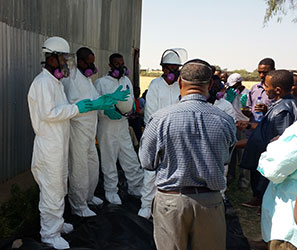
Mr. Samir Awol, a Public Health Officer and Zonal Malaria Focal Person, provides guidance to DDT collection technicians during a practical training session at a district store. Photo: AIRS Ethiopia
The PMI AIRS Project is safely disposing of expired insecticide, reducing public health and environmental risks
For the past six decades, the Government of Ethiopia has used a variety of insecticides for indoor residual spraying (IRS), including DDT, malathion, deltamethrin, bendiocarb, and propoxur. Over time, the country has accumulated large stocks of expired insecticides as a result of both inadequate forecasting of insecticide needs and malaria vectors’ growing resistance to the insecticides.
Currently, the country is storing approximately 1,600 tons of obsolete DDT across the country, posing public health and environmental risks. In efforts to reduce risk of toxic exposure, the U.S. President’s Malaria Initiative (PMI) Africa Indoor Residual Spraying (AIRS) Project is helping to dispose of some 85 tons of DDT and associated contaminated wastes from 47 districts and zonal stores in Ethiopia’s Oromia Region in an environmentally sound manner.
The PMI AIRS Project has trained 57 supervisors and 40 technicians to facilitate the collection and repacking of the insecticide. The supervisors were either environmental health officers or malaria focal persons at the district and zonal level. The training covered health and environmental safety and proper handling of hazardous materials during repackaging, cleaning of the storage facilities, and transportation of the expired chemicals.
Mr. Elias Gudeta, the Jimma Zonal Coordinator for the DDT collection operation and a public health officer by profession, said that through PMI’s support, his zone would be free of some 15 tons of obsolete DDT.
“It is almost a miracle for me to see that my zone will be free of obsolete DDT, and I hope that similar initiatives will be taken to clear the whole country of these chemicals,” Mr. Gudeta said.
He thanked PMI, AIRS Ethiopia, the Ministry of Health and Ministry of Environment and Forest for making this initial but important step toward protecting the environment and public health.
Several supervisors pointed to the danger obsolete chemicals, including DDT, posed when stored close to offices and residential areas and were grateful to PMI for the support. They reiterated their commitment in supervising the DDT collection activity in their respective areas and in playing key roles as trained resource persons in similar activities in the future.
This story was taken from www.africairs.net
